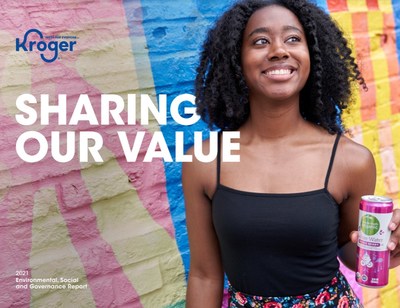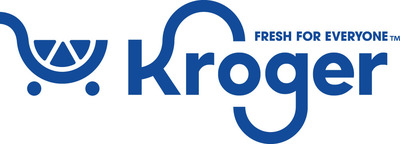Kroger Releases 2021 Environmental, Social and Governance Report
The Kroger Co. (NYSE: KR) has published its 2021 Environmental, Social and Governance (ESG) report, outlining a new long-term ESG strategy focused on enhancing food systems and community support. Key achievements include directing over $301 million to hunger relief and administering millions of COVID-19 vaccines. The report emphasizes goals across three pillars: People, Planet, and Systems, with aims to direct 3 billion meals to communities by 2025 and significantly reduce emissions.
- Directed over $301 million to hunger relief in 2020.
- Increased average hourly wage for store associates to $15.50.
- Achieved a record 641 million meals directed to communities in 2020.
- None.
CINCINNATI, Aug. 25, 2021 /PRNewswire/ -- The Kroger Co. (NYSE: KR) today released its 2021 Environmental, Social and Governance (ESG) report, sharing its new long-term ESG strategy and framework to benefit people and the planet, and to help create a more resilient, equitable food system for tomorrow.
"As a grocery retailer, Kroger is committed to advancing positive impacts for people and our planet and to creating more resilient global systems," said Rodney McMullen, Kroger's chairman and CEO. "Even throughout a difficult year, our team continued to make progress on our goals while still playing a key role in providing fresh food and essential goods to our communities. Through our Zero Hunger | Zero Waste social and environmental impact plan—the centerpiece of our ESG strategy—we continue to break down barriers to food access and capture the full value of food produced across the U.S. food system especially for those struggling with hunger amid an ongoing public health crisis."
The 2021 report features the company's ESG strategy, which encompasses topics and long-term targets in three pillars: People (Social), Planet (Environmental), and Systems (Governance). It expresses Kroger's aspiration to further integrate ESG performance into lines of business and to continue developing a shared-value framework that unlocks economic opportunity for all stakeholders.
"Our strategic approach to ESG priorities is rooted in creating business value and uplifting our associates, customers, and communities," said Keith Dailey, Kroger's group vice president of corporate affairs and chief sustainability officer. "We are acutely focused on how we will further advance our purpose to feed the human spirit as a leading retailer, employer, and community partner."
2020 Achievements
People: Help billions live healthier, more sustainable lifestyles
- Directed a total of
$301 million in food and funds to communities, including nearly$213 million to hunger relief during a challenging year. - Directed nearly
$33 million in combined Foundation grants to communities, a60% increase in grant-making versus the prior year. - Directed a record one-year total of 641 million meals to communities in food and funds in 2020, including 90 million pounds of food donated through Kroger's Zero Hunger | Zero Waste Food Rescue program. Since introducing Zero Hunger | Zero Waste four years ago, the company has directed a total of 1.8 billion meals to communities toward its goal of a combined 3 billion meals by 2025.
- Invested more than
$2.5 billion to support associates during the peak of the pandemic, including$1 billion to better secure pensions for over 30,000 associates. - Increased average wage for hourly store associates to
$15.50 , bringing rate to more than$20 per hour when comprehensive benefits are included. - Administered COVID-19 vaccines to millions of Americans by Kroger Health pharmacists, nurse practitioners and clinicians.
- Created Kroger's Framework for Action: Diversity, Equity & Inclusion plan, featuring both immediate and longer-term steps developed in collaboration with associates and leaders to accelerate and promote greater change in the workplace and in the communities Kroger serves.
Planet: Protect and restore natural resources for a brighter future
- Decreased total carbon emissions by
11.6% . The company's normalized emissions (per 1,000 square feet) also declined in 2020, from 25.8 to 22.59. Reductions in stationary fuel and electricity consumption were at least partially driven by pandemic-related changes. - Reduced total food waste generated in retail stores by
7.2% , while the percentage of food waste diverted from landfill improved by3.5% percentage points to48.3% . - Achieved a company-wide waste diversion rate of
81% in 2020, a1% improvement from 2019. - Joined the Consortium to Reinvent the Retail Bag as the Grocery Sector Lead.
- Launched a new recycling program in partnership with TerraCycle. This solution allows customers to send harder-to-recycle flexible plastic packaging for popular Simple Truth® items to TerraCycle for safe and effective recycling. In 2021, Kroger and TerraCycle expanded the program to include flexible plastic packaging from all Our Brands products.
- Sourced 58.9 million pounds of Fair Trade Certified™ ingredients for Our Brands products, nearly doubling the volume of ingredients in 2019.
- Achieved a
10% decrease in total water consumed between 2019 and 2020. - Postponed the Zero Hunger | Zero Waste Foundation's second Innovation Fund open call and instead directed a total of
$400,000 in new grants to members of the first group of portfolio companies able to continue operating during the pandemic. This funding was in addition to the$1 million cohort members received collectively the prior year. The Innovation Fund held an open call for the second cohort in the first half of 2021.
Systems: Build more responsible and inclusive global systems
- Spent
$4.1 billion with diverse suppliers, a21% increase versus the previous year and fourth consecutive year of double-digit growth. - Sourced
86% of wild-caught seafood and98% of farm-raised seafood in Kroger's seafood department from fisheries and farms meeting company's seafood sustainability requirements. - Joined the Global Coalition for Animal Welfare, which convenes food retailers, foodservice providers, producers and animal welfare experts to improve standards at scale to meet consumer demand for food from animals reared in systems that promote good welfare.
- Crafted a series of updated policies and statements to help guide decisions related to company's operations and global supply chain, including Statement on Human Rights, Seafood Sustainability Policy, Animal Welfare Policy and Safer Chemicals Statement.
"Reflecting on the past year, and despite the challenges of COVID-19, we are pleased to have made significant progress on our 2020 sustainability goals, and in some instances, exceeded our objectives," continued Dailey. "We are now focused on what lies ahead and progressing our ESG work through the next decade."
Looking Ahead
Going forward, Kroger is focused on achieving the following long-term targets, among others, as part of its comprehensive ESG Strategy: Thriving Together.
People: Help billions live healthier, more sustainable lifestyles
- Direct a cumulative 3 billion meals to communities by 2025.
- Increase retail donations of fresh produce, deli and dairy items to be
45% of total surplus food rescue. - Advance Food as Medicine strategy by achieving a
20% improvement in the five social determinants of health by 2025. - Increase retail hourly wages sustainably.
- Engage diverse stakeholders to co-create more just and equitable communities.
Planet: Protect and restore natural resources for a brighter future
- Accomplish
30% cumulative reduction in greenhouse gas emissions by 2030 (baseline: 2018); set a Scope 3 emissions target. - Achieve zero waste company-wide and zero retail food waste to landfills by 2025.
- Incorporate more sustainable packaging, including:
100% recyclable, compostable and/or reusable Our Brands packaging by 2030. - Achieve no-deforestation commitment for Our Brands products by 2030.
- Expand Our Brands' participation in the Sustainable Coffee Challenge by committing Private Selection® to source
100% Fair Trade Certified coffee from international growing regions by mid-2022. - Launch innovative reusable packaging platform as Loop's exclusive U.S. grocery retail partner to advance company's zero-waste vision by reducing single-use plastics in the environment.
- Phase out single-use plastic grocery shopping bags by 2025.
Systems: Build more responsible and inclusive global systems
- Respect human rights by aligning approach to the UN Guiding Principles and human rights due diligence framework.
- Leverage supply chain network to align with ESG strategy for greater collective impact.
- Increase spend with diverse suppliers to
$10 billion annually by 2030.
To read Kroger's full 2021 ESG report, including 2020 outcomes and forward-thinking goals, visit here. In addition to the company's annual ESG report, you can also view new reports for The Kroger Co. Foundation and The Kroger Co. Zero Hunger | Zero Waste Foundation that highlight how the company continues to align philanthropy to support its Zero Hunger | Zero Waste mission and help advance positive change in communities.
About Kroger
At The Kroger Co. (NYSE: KR), we are Fresh for Everyone™ and dedicated to our Purpose: To Feed the Human Spirit®. We are, across our family of companies, nearly half a million associates who serve over 11 million customers daily through a seamless shopping experience under a variety of banner names. We are committed to creating #ZeroHungerZeroWaste communities by 2025. To learn more about us, visit our newsroom and investor relations site.
![]() View original content to download multimedia:https://www.prnewswire.com/news-releases/kroger-releases-2021-environmental-social-and-governance-report-301362735.html
View original content to download multimedia:https://www.prnewswire.com/news-releases/kroger-releases-2021-environmental-social-and-governance-report-301362735.html
SOURCE The Kroger Co.
FAQ
What is the focus of Kroger's 2021 ESG report?
How much did Kroger donate to hunger relief in 2020?
What goals does Kroger aim to achieve by 2025?









